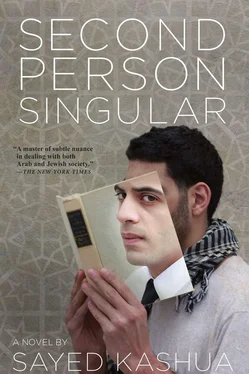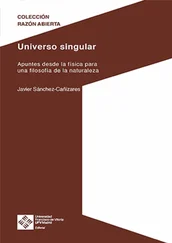I packed a bag at the apartment and saw Wassim and Majdi as they were heading home to their village. When I finally got home for the Festival of the Sacrifice, I squeezed my mother’s hand and she squeezed mine. I could see in her face that she wanted to hug me, but she knew it was best to resist that urge. Instead her eyes glazed over. Me and my mother did not hug or kiss. At times I would try to imagine what that kind of touch might feel like. I was sure she had held me and cuddled me when I was a baby, at the very least in order to feed me, and I tried to imagine that feeling but couldn’t. Perhaps, I used to think, if I had a picture of her holding me as a baby it would help.
“Eight weeks,” she said, trying to break the awkwardness. “What did you do with all your clothes?”
“What I always do. I washed my underwear in the sink. No problem.”
“Are you hungry?” she asked, putting my bags back in the house.
“Soon.”
“Do you need to use the bathroom?” she asked, then started sorting the clothes and throwing them into the washing machine in the bathroom.
I shook my head.
“Mom, I’m going to go say hi to um-Bassem,” I said, and went outside into the courtyard.
Um-Bassem’s door was open. “ Siti, ” I called out before going in.
“Come, welcome,” I heard her say.
She was on a prayer mat in the living room. The radio played verses from the Koran. It would soon be time for the afternoon prayer and um-Bassem could no longer hear the village muezzin’s call to prayer so she used a radio station from Jordan to know when to pray — precisely one minute after the radio, because that, she had decided, was the time difference between Amman and Jaljulia.
Standing at the door with the light at my back, she couldn’t recognize me. She brought a hand up to her face to shield her eyes and started to get up off the mat. “Stay where you are, Siti, it’s me,” I said as I walked toward her.
“ Ahalan, ahalan, ahalan,” she said, opening her arms. I bent over to hug her and she kissed me on the cheeks and the head. “How are you, ya habibi ?” she beamed. “What kind of evil have you been up to? Fifty-four days and we hear nothing from you. How are you? Is everything okay?”
“I’m fine, Siti, how are you?”
“ Alhamdulillah. I’m waiting to pray, but the radio keeps coming in and out. These Jordanians can’t sit still. I find them and then they disappear. It’s not prayer time yet, is it?”
“Not yet. Soon.”
“When did you come? Now?”
“Just now.”
“So go eat first, and I’ll pray. I want to talk to you. This is how you treat your mother? What did she ever do to you?” As I was about to leave, she fished around under the couch and pulled out an envelope. “This is halaweh, for the good grades and the tests. Your mother told me you’re all set to be a social worker now. May God be with you always. Allah, every prayer I mention you and ask Him to keep you safe.” I took the envelope and kissed her on the cheek.
“Allah be with you, I’ll come soon.”
I knew that there was money in the envelope and that there was no way I’d be able to refuse it. She gave me a present at the end of every school year. “ Halaweh for your grades,” she would say. When I was young I liked her envelopes a lot more than the good grades. I’d run over to her house with my report card, knowing that she wouldn’t be able to read it and that the envelope was waiting for me anyway, because she knew I got the best grades in the class. “Bassem was the same way,” she would say. “He was smart like you. Always top of the class. Now he’s in Italy, a big doctor.”
I remember the first time Bassem came to visit Jaljulia. He had a fair-skinned wife who couldn’t speak. Um-Bassem decorated the courtyard and we helped her hang balloons and a poster board on which I’d written, in honor of doctor bassem abu-ras. Early in the morning um-Bassem’s four daughters, Bassem’s sisters, showed up with their children and began to wait for him. He arrived and kissed his mother and his sisters, who introduced him to their children. He hugged and kissed each one of them and gave them each a little plane with blinking lights. I remember waiting for my hug and my plane and Bassem asked, “Who’s this little guy, whose son is he?” and one of the aunts said that we were just renting an apartment. “That’s my grandson,” um-Bassem said. “As dear to me as a son.” Afterward she took me inside and told me in a whisper that Bassem had gotten me the best plane of all but that she was keeping it with her because she didn’t want the other children to get jealous. It was a long time before I understood that she had gone out the next day to Petach Tikva to buy me the remote-control airplane.
Mom and I had lived with um-Bassem ever since we left Tira. The unit we lived in was a little apartment that um-Bassem had built for her son when he left for Italy to study medicine but he had never returned to live in it. I was one year old when we moved into um-Bassem’s place. My mother ran away from Tira the year after my father’s death, when I was less than one month old. After the mourning period was over, my father’s family and my mother’s father, who was actually my father’s uncle, demanded that she marry my uncle, my father’s younger brother, to preserve her honor.
Even now I don’t know exactly what happened, but I do know that my mother refused to marry my uncle and that she ran away from the village to Jaljulia. She left my father’s house, left everything behind, taking only me and a small bag of clothes. The family never forgave her. They cut her off. Her family did the same. My uncles on my father’s side and my only uncle on my mother’s side never once came to visit us, not even on holidays when it’s commanded that you visit the women of the family. I remember my mother crying inconsolably when they told her over the phone that her father had died. My uncle came to get me for the funeral but my mother stayed in Jaljulia.
There were five hundred shekels in um-Bassem’s envelope.
“Mom, that’s too much. I feel bad.”
“Just don’t disappoint her,” my mother said, lighting a cigarette. My mother was always bashful when she smoked in front of me. She never smoked outside, only at home. Her eyes would ask permission before she picked a cigarette out of the pack. She was forty-five, but she looked older. She was skinny and her face was furrowed. There was something especially old about her face, about that unchanging look, a look that seemed to be forever apologizing.
My mother had bought meat and charcoal, as she did every year. On every Festival of the Sacrifice, she tried for us to be like everyone else, with smoke and the smell of grilling meat swirling out of the courtyard. “Will you light the fire?” she asked before going inside to prepare the meat and the salads. “Yes,” I said, heading out to the yard. Small children played with cap guns and loud music bellowed out of aimlessly wandering cars. I dumped the charcoal into the grill and my mother came out with the matches and a few blocks of fire starter. “Use this, it’s better,” she said. “The lighter fluid leaves a bad taste on the meat.”
Back when I was little, it was always me and my mother, just us, eating the meat of the Festival of the Sacrifice. We never roasted a lamb because “Who’s going to slaughter it?” as she always asked when I wanted to have the same thing the other kids in the class had.
Now, fire leaped up from the starter blocks and I took the tongs and began building a cone of charcoal, taking the wind direction into account, leaving deliberate air vents in the construction. I used to like that, being in charge of the charcoal. I had to. “On the Festival of the Sacrifice,” I heard my religious studies teacher intoning, “not everyone can afford to buy a lamb, not everyone can afford to buy meat. A true Muslim is considerate of his neighbors, considerate of others, those who do not have. A good Muslim gives meat to his hungry neighbors and does not think only of his own stomach.” I remember wanting to be a good Muslim but I remember, more forcefully, wanting not to be the hungry neighbor on the Festival of the Sacrifice.
Читать дальше












